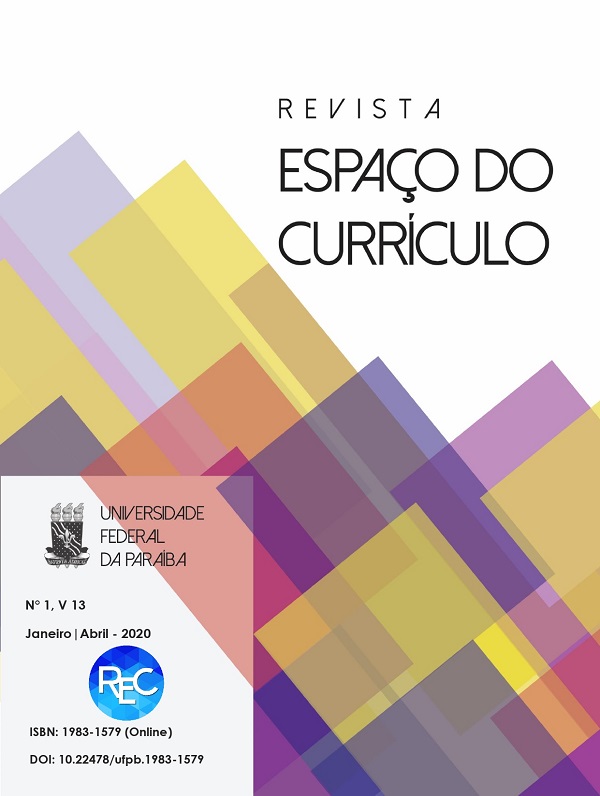INTERCULTURAL CURRICULUM
construction experience with the Huni Kuin people
DOI:
https://doi.org/10.22478/ufpb.1983-1579.2020v13n1.50753Keywords:
Curriculum, Intercultural education, People, Huni KuinAbstract
The text is situated in the scope of the construction of the curricular design of the Integrated Technical Course to High School in Indigenous intercultural teaching with teachers from the Huni Kuin people, from the municipalities of Tarauacá, Jordão, Feijó and Marechal Thaumaturgo, developed at the Intercultural Laboratory - LABINTER UFAC, linked to the Graduate Program in Languages: Language Identity. The article aims to analyze the path and tensions that involved the construction of intercultural curricular design with this people. In the investigative path, the production of the Modernity-Coloniality Group was privileged, mainly because of what is circumscribed in the thought of Walsh (2005). In the first moment, some concepts are presented that guided the construction of the curricular design where the desire to not impose the school culture, historically built for those who are not indigenous, prevailed. In the sequence, brief history is outlined of what has been constituted the education of the indigenous peoples and the political decision of the Huni Kuin people to turn to an education that actually serves their interests. Finally, the journey and tensions that involved the construction of the intercultural curricular design with these people are narrated. All the documentation produced the group at the Interculturality Laboratory - Labinter field diary produced in the year of 2019 in the environment of the meetings during the III International Seminar of Indigenous Languages and Cultures - Amerindian languages: diversities, traditions and memories) and master's dissertations that addressed the educational aspects of the Huni Kuin.
Downloads
Metrics
References
ALTHUSSER, Louis. Aparelhos ideológicos de estado: notas sobre os aparelhos ideológicos de estado. 10ª ed. Rio de Janeiro, Graal, 1985.
BANIWA, Gersem. Educação escolar indígena no século XXI: encantos e desencantos. 1ª ed. Rio de Janeiro: Mórula, Laboratório de pesquisas em etnicidade, cultura e desenvolvimento – LACED, 2019.
BANIWA, Gersem. Língua, educação e interculturalidade na perspectiva indígena. In: ALBUQUERQUE, Gerson Rodrigues. Das margens. Rio Branco, Nepan editora, 2016.
BERGAMASCHI, Maria Aparecida; DOEBBER, Michele Barcelos; BRITO, Patricia Oliveira. Estudantes indígenas em universidades brasileiras: um estudo das políticas de acesso e permanência. Revista Brasileira de Estudos Pedagógicos, Brasília, v. 99, n. 251, p. 37-53, jan./abr, 2018.
BOURDIEU, Pierre. A reprodução. Rio de Janeiro: Francisco Alves, 1992.
BOURDIEU, Pierre. A economia das trocas simbólicas. São Paulo: Perspectiva, 1987.
CANDAU, V. M. (Org.). Didática crítica intercultural: aproximações. Petrópolis (RJ): Vozes, 2012.
GRUPIONI, Luís Donizete Benzi. O ponto de vista dos professores indígenas: entrevista com Joaquim Maná Kaxinawá, Fausto Mandulão Macuxi e Francisca Novantino Pereci. Em Aberto. Brasília, v. 20, n. 76, p. 154-176, fev. 2003.
VEIGA-NETO, Alfredo. Incluir para excluir. In: LARROSA, Jorge; SKLIAR. Habitantes de babel: políticas e poéticas da diferença. Tradução de Semíramis Gorini da Veiga. 2ª ed. Belo Horizonte: Autêntica Editora, 2011.
WALSH, Cathrine. Pensamento crítico y matriz (de)colonial: reflexões latino-americanas. Quito: Ediciones Abya-yala, 2005.
GONÇALVES, R. M. Bricolagens praticadas e políticaspráticas de currículos nos cotidianos escolares / Rafael Marques Gonçalves. Rio de Janeiro/ UERJ, 2018.
GONÇALVES, R. M. Autonomia e Políticaspráticas de Currículos: uma equação entre raízes e opções. Educ. Real., Porto Alegre , v. 44, n. 3, e84870, 2019 . Available from <http://www.scielo.br/scielo.php?script=sci_arttext&pid=S2175-62362019000300401&lng=en&nrm=iso>. access on 26 May 2020. Epub Sep 12, 2019. https://doi.org/10.1590/2175-623684870.
GONÇALVES, R. M;et at all. A BNCC NA CONTRAMÃO DAS DEMANDAS SOCIAIS: PLANEJAMENTO COM E PLANEJAMENTO PARA. Práxis Educacional, [S.l.], v. 16, n. 38, p. 338-351, jan. 2020. ISSN 2178-2679. Disponível em: <http://periodicos2.uesb.br/index.php/praxis/article/view/6012>. Acesso em: 26 maio 2020. doi: https://doi.org/10.22481/praxisedu.v16i38.6012.
GONÇALVES, R. M. CONVERSAS SOBRE PRÁTICAS E CURRÍCULOS ENTRE PROFESSORAS: ARTESANIA E MANEIRAS DE FAZER O COTIDIANO ESCOLAR. Linguagens, Educação e Sociedade, Teresina, Ano 23, Edição Especial, dez. 2018. Disponível em: https://revistas.ufpi.br/index.php/lingedusoc/article/view/7876. Acesso em 26 de maio de 2020. Doi: https://doi.org/10.26694/les.v1i1.7876
Downloads
Published
How to Cite
Issue
Section
License
By submitting an article to Curriculum Space Journal (CSJ) and having it approved, the authors agree to assign, without remuneration, the following rights to Curriculum Space Journal: first publication rights and permission for CSJ to redistribute this article. article and its metadata to the indexing and reference services that its editors deem appropriate.
















